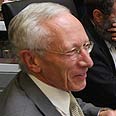"There is no doubt that the most difficult phases of the economic crisis are behind us," Fischer told reporters before leaving for Istanbul for the International Monetary Fund meeting that began on Thursday.
"I am not concerned about whether we will or will not recover from the crisis but rather from our ability to draw lessons and fix the system," said Fischer, first deputy managing director of the IMF from 1994 through 2001 and one of the world's most listened-to central bankers. "There are problems with this in the United States and England."
He specifically pointed to political bickering over fixing the hard-hit US banking system. Yet, Fischer said he believed that the United States would ultimately emerge stronger than European countries from the crisis.
Addition of non-developed countries
Fischer said that one of the main elements of the crisis was allowing Lehman Brothers to collapse, calling it "irresponsible."
"The fall of Lehman Brothers cost the economy a lot and only in many years to come we will be able to draw lessons from its demise," Fischer said.
He noted that a key change to the global economy during this tough period was that leadership shifted from the Group of Seven largest economies to the G20.
"The most significant change is the addition of non-developed countries like China, India, Brazil and South Africa," he said.
Now, the main question is how to spur growth rather than reversing the expansive fiscal policies that were introduced to contain the crisis.
Fischer said that the global economy started to turn in April and May after a huge downturn in the prior months.
















